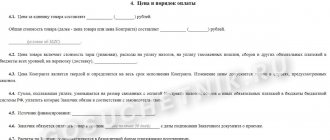5
When inheriting the property of a deceased person, disputes often arise. The testator's relatives are often dissatisfied with the size of the share assigned to him, challenge the will or try to restore the deadlines for taking over the rights. More and more legal disputes are associated with the recognition of heirs as unworthy. Of course, just a statement is not enough - you need evidence, and strong evidence at that!
Is it possible and how to recognize an heir as unworthy? The process is not easy, so we will look at all the reasons and nuances so that you have an idea of the progress of the case. Well, if you have any questions, you can ask our lawyers.
Who is the unworthy heir?
Many people have probably heard the concept of “unworthy heir.” However, few people know what it means and who it applies to? The legislator devotes an entire article to the term - 1117 of the Civil Code of the Russian Federation, which answers many questions.
An unworthy heir is a citizen who has committed illegal actions against the testator. The goal could be to increase one's own share of the inheritance. Moreover, illegal actions can be committed not only by the main contender, but also by third parties at his request.
Suppose the heir was found unworthy. What consequences does this status entail? Heirs who are found unworthy lose the right to the property of the deceased . It happens that the applicant is deprived of the right, being in the first category of relationship. There are cases where children, parents and spouses were recognized as unworthy heirs.
The fact of unworthiness is confirmed exclusively through the court. Suspicions of relatives or assumptions of heirs do not deprive the applicant of his legal rights. For example, if the heir did not participate in paying utility bills, but later claimed rights to the inheritance, he will most likely receive the inheritance. There can be no talk of any “unworthy” status.
Features of disputes
In cases related to the recognition of one of the applicants for an inheritance as an unworthy heir, there are a number of specific features.
Will
Absolutely any heir can be considered unworthy to accept the inheritance of a deceased person, regardless of how the inheritance occurs - in order of priority, or by will. However, the law allows the testator to transfer rights to property after his death even to a person who falls under the characteristics of an unworthy person.
But an unworthy heir can still be called upon to inherit. To do this, the testator must draw up a will after the successor has committed actions that deprive him of the right to inherit.
If the will is drawn up in accordance with the requirements of the law, the testator was not subject to any pressure from the heir, the risk of challenging the last will is minimal.
Accepted inheritance
In certain situations, the interested person needs to exclude the heir who has already accepted it from the inheritance. It is quite natural that the notary has no right to revoke a previously issued Certificate. Therefore, the interested party will have to go to court.
If the claim is satisfied, the unworthy heir will have to return all the property of the deceased received. If the inheritance was sold or irretrievably alienated in another way, the unworthy successor will have to compensate the bona fide successors for its market value.
Grounds for recognizing an heir as dishonest and unworthy
To initiate a court hearing, compelling reasons are required - we remind you that they are listed in Art. 1117 of the Civil Code of the Russian Federation.
Let's look at them in order:
- Unlawful actions towards a deceased citizen
This includes persons who committed unlawful acts against a deceased citizen. For example, forgery/destruction of a will, forcing the testator to draw up a document in his name, or murder (due to jealousy).
The main goal is to increase the share of the inheritance. The heirs themselves could make attempts to instill their desires in the testator or persuade other applicants. However, regardless of what actions the unworthy heirs committed, these facts must be proven in court. Mere assumptions from the relatives of the deceased person are not enough.
Read, is it possible and how to invalidate a will?
- Evasion of obligations to support the testator
It is important to note that the obligation to support the deceased arises for a reason. There must be a logical explanation for this, namely a court decision. A striking example is the obligation to pay alimony for a child or disabled persons (Article 80 and Article 88 of the RF IC). For example, the father did not pay child support, as a result of which the child did not receive the necessary help. Debt for alimony is direct evidence not in favor of the unfortunate alimony payer.
- Deprivation of parental rights
It occurs quite often, not only in relation to fathers, but also mothers. However, if the reasons that formed the basis of the court decision no longer exist, such persons may apply to the court with a request to restore parental rights. If the court grants the request of the mother or father, their rights are subject to restoration. Further inheritance of parents/children's assets will occur in accordance with the general procedure.
Commentary to Art. 1117 Civil Code of the Russian Federation
1. Article 1117 is devoted to unworthy heirs who, due to their dishonesty: a) do not have the right to inherit by virtue of the direct instructions of the law (clause 1); b) are excluded from inheritance by court decision (paragraph 2), while the former (“unworthy by law”) in some cases cannot inherit either by law or by will, in others - only by law (cf. paragraph 1 and 2 p. 1), the latter (“unworthy by court”) cannot inherit only by law. An unworthy heir does not have the right to inherit only after a certain testator, therefore this measure is a civil sanction; on the contrary, it does not limit inheritance capacity, since it does not prevent such an heir from inheriting after other testators. However, the title of Art. 1117 does not correspond to its content and potential, since in reality it concerns: a) not only unscrupulous persons, but also persons in whose interests the unscrupulous person acted, as well as representing heirs who themselves may be completely conscientious (paragraph 1 p. 1 Article 1117, paragraph 3 Article 1146 Civil Code); b) not only heirs, but also legatees (clause 5 of Article 1117 of the Civil Code).
2. Unworthy heirs according to the law are persons who have committed illegal actions in relation to: a) the testator; b) any of the heirs (both by will and by law); c) implementation of the last will of the testator, expressed in the will (paragraph 1, paragraph 1, article 1117). This list of objects for committing illegal actions is exhaustive. In this case, we are talking only about a deliberate action through which an unworthy heir contributed (tried to promote) the calling of himself (other persons) to inherit or an increase in the share of the inheritance due to him (other persons). Hence the illegal action referred to in paragraph. 1 clause 1 art. 1117, qualify two features - the object and the subjective side, therefore, unworthy heirs cannot be persons: a) who have committed illegal actions not in relation to the testator (including the last will of the testator) or heirs, but in relation to any other persons; b) who committed unlawful acts through negligence; c) minors and incompetent, as well as insane (since the corresponding age and state of health exclude their guilt - Articles 28, 29 of the Civil Code, Article 21 of the Criminal Code). In connection with the rule par. 1 clause 1 art. 1117 the following clarifications are important.
(1) Rule para. 1 clause 1 art. 1117 is subject to distributive interpretation. Although formally it speaks of unlawful intentional actions of an unworthy heir, his unlawful intentional inaction (in relation to the testator or heirs) cannot be ruled out. An unlawful intentional act can be completed or unfinished (accordingly, if the heir contributed or only tried to promote the calling to inherit or increase the share of the inheritance - cf. murder and attempted murder of the testator).
(2) Civil legislation, unlike criminal legislation, does not contain a definition of guilt, its forms (intention and negligence) and their varieties (cf. Art. 401 of the Civil Code with Art. 25, 26 of the Criminal Code), while the number of cases when civil consequences were associated with a certain form (type) of guilt, not so great (see paragraph 4 of Article 401, Article 169, paragraph 4 of Article 227, paragraph 1 of Article 578, paragraph 1 of Article 693 , article 697, paragraph 4, article 720, article 901, 948, paragraph 3, article 962, paragraph 1, article 963, paragraph 1, article 965, article 1083, paragraph 4, article 1090, paragraph 2 of article 1104, article 1108 of the Civil Code). Another example of this is the rule in para. 1 clause 1 art. 1117. Taking into account two circumstances: a) the absence of its own definition of intent in the Civil Code; b) the nature of the actions referred to in paragraph. 1 clause 1 art. 1117, - the meaning of the deliberate actions of an unworthy heir is revealed by the rules of Art. 2.2 Code of Administrative Offenses and Art. 25 of the Criminal Code.
When committing illegal actions against the testator or heirs, an unworthy heir must: a) be aware of the illegality of his behavior, foresee the possibility or inevitability of harmful consequences and desire their occurrence (direct intent), or b) be aware of the illegality of his behavior, foresee the possibility of harmful consequences, while not desire, but consciously allow these consequences or treat them with indifference (indirect intent). The unlawful behavior of an unworthy heir is caused by self-interest (the desire to inherit or increase the share of the inheritance) or other motivation, which, however, is not of fundamental importance. In fact: a) in para. 1 clause 1 art. 1117 speaks of an unlawful intentional action that contributed to the call to inheritance (increase in the share of the inheritance), and changes in matters of receiving an inheritance (the size of the share of the inheritance) lead to murder not only for self-interest, but also out of revenge, jealousy, hooligan motives and in other cases ( see paragraph 2 of article 105 of the Criminal Code); b) limitation of application of Art. 1117 only cases of selfish motivation will leave aside other motives (no less base and asocial), which would be at least illogical and unreasonable.
(3) Intentional illegal acts can be committed in the own interests of an unworthy heir or in the interests of other persons (for example, his children or even an organization of which he is a member). The citizen who committed them is an unworthy heir who cannot inherit after the corresponding testator, no matter in whose interests he acted, but it is clear that the question of his unworthiness as an heir arises only if he himself is called to inherit. As for other persons in whose interests he acted, in different situations they may: a) acquire or not acquire the status of an unworthy heir (cf. their complicity in committing intentional unlawful acts and their good faith); b) in the latter case - to inherit or not to inherit the property of the deceased (cf. the removal of an heir under a will in the interests of a bona fide legal heir and coercion to make a will in favor of a bona fide person, which was subsequently effectively contested by the legal heirs). Finally, if suddenly unlawful intentional actions were committed by a legal heir from among the first three orders in the interests of his descendant, the latter does not have the right to inherit by right of representation due to the direct indication of clause 3 of Art. 1146 Civil Code.
(4) Provided by para. 1 clause 1 art. 1117, the sanction in the form of impossibility of inheritance either by law or by will is common to any intentional unlawful act, regardless of the specifics of its legal assessment (qualification), which means that such an act may or may not contain elements of a crime. In turn, the general phrase about the need to confirm relevant circumstances in court means the following:
(a) these circumstances can be established both in criminal proceedings (in relation to a fraudster, extortionist, a person who killed or committed suicide of an heir, etc.) and in civil proceedings (for example, when filing a tort claim - Article 1064 Civil Code, a claim to contest a will - paragraph 2 of Article 1131 of the Civil Code), and sometimes this is possible only after the opening of the inheritance (paragraph 2 of paragraph 2 of Article 1131 of the Civil Code);
(b) these circumstances must be examined in court, and it is sufficient that they are confirmed by the evidence collected in the case, and the individual characteristics of the verdict or decision made by the court do not matter (for example, it does not matter whether the person was held criminally liable and whether she was punished or avoided due to the expiration of the statute of limitations for criminal prosecution or amnesty). In conditions of a shortage of evidence in a criminal trial, there is a presumption of innocence, the refutation of which is the task of the preliminary investigation authorities, and its non-refutation means that the attacker will avoid criminal liability, and at the same time - without initiating and outside the framework of another judicial (civil or criminal) process - is subject to application of Art. 1117 (Article 14 of the Code of Criminal Procedure). In civil proceedings, there is a presumption of bad faith, its refutation is the task of the defendant (see paragraph 2 of Article 1064 and the more general paragraph 2 of Article 401 of the Civil Code), and its failure to refute it is fraught with recognition as an unworthy heir.
The peculiarity of the considered category of unworthy heirs in comparison with the other two, which will be discussed below, is that after committing an unlawful, intentional and judicially confirmed act, they: a) do not have the right to inherit, in any case by law, as well as by will, committed before they lost the right of inheritance; b) has the right to inherit under a will made after they have lost the right of inheritance (cf. sentences 1 and 2, paragraph 1, paragraph 1, Article 1117). The latter is possible under two conditions: a) if the testator remains alive (otherwise he would not be able to make a will); b) if, despite what happened, the generous testator bequeathed property to the unworthy heir (forgave him). The following is fundamental: a) “forgiveness” is possible only through a will - other forms and methods of “forgiveness”, as well as other circumstances significant for other branches of law, for Art. 1117 do not matter (this, in particular, applies to cases of reconciliation in accordance with Article 76 of the Criminal Code, expiration of the statute of limitations for criminal prosecution - Article 78 of the Criminal Code, amnesty - Article 84 of the Criminal Code, expungement or expungement of a criminal record - Article 86 of the Criminal Code); b) the “forgiven” heir can therefore inherit only by will and only the property bequeathed to him (if part of the property remains unwilled, he has no right to inherit it, since in this part he “did not receive forgiveness”, and therefore continues to remain an unworthy heir) ; c) “forgiveness” is possible only after the heir has lost the right to inherit, i.e. after the relevant circumstances have been examined and confirmed (proven) in the trial; d) the motivation of the generous testator does not matter, however, a will that “forgives” an unworthy heir (like any other) may be voidable or void (Article 1131 of the Civil Code).
3. Another category of unworthy heirs according to the law are persons deprived of parental rights and not restored to them by the day the inheritance was opened (paragraph 2, paragraph 1, article 1117).
(1) We are talking about the first-priority legal heirs after each other (clause 1 of Article 1142 of the Civil Code) - parents and their children, while the former, due to their bad faith, are deprived of parental rights in relation to the latter (and at the same time - the right to inherit after them ). Parents (one of them) may be deprived of parental rights if they: a) evade fulfilling their duties, including malicious evasion of child support; b) refuse, without good reason, to take their child from the maternity hospital (department) or from another medical (educational) institution, social welfare institution, or similar organizations; c) abuse parental rights; d) abuse children, including physical (mental) violence against them, attacks on their sexual integrity; e) suffer from chronic alcoholism (drug addiction); f) committed a deliberate crime against the life (health) of their children (spouse). The list of grounds for deprivation of parental rights, given the nature of this measure, is exhaustive (Article 69 of the Family Code). Deprivation of parental rights is carried out in court, the case is considered upon the application of: a) one of the parents (persons replacing them); b) prosecutor; c) bodies (organizations) responsible for protecting the rights of minors (including guardianship and trusteeship bodies, commissions for minors, organizations for orphans and children without parental care). When considering a case with the mandatory participation of the prosecutor and the guardianship and trusteeship authority, the court must: a) decide the issue of collecting child support from the parents (one of them) deprived of parental rights; b) notify the prosecutor if signs of a crime are detected in the actions of the parents (one of them); c) within three days from the date of entry into legal force of the decision on deprivation of parental rights, send an extract from the decision to the civil registry office at the place of registration of the child’s birth (Article 70 of the Family Code).
(2) Parents deprived of parental rights: a) lose all rights based on the fact of relationship with the child (including the right to receive maintenance from him - Article 87 of the Family Code, to benefits and state benefits established for citizens with children) ; b) do not inherit after their children only by law (but can inherit by will); c) are not released from the obligation to support the child. On the contrary, the child retains: a) the right of ownership of residential premises (the right to use residential premises); b) property rights based on the fact of relationship with parents and other relatives (including the right to inheritance). The issue of further cohabitation of the child and the parents (one of them) deprived of parental rights is decided by the court in the manner established by housing legislation. Thus, citizen-tenants deprived of parental rights and (or) family members living with them can be evicted from residential premises without providing another residential premises if the court finds it impossible for these citizens to live together with children (clause 2 of Article 91 of the Housing Code). If parental rights are deprived of both parents (the impossibility of transferring the child to a parent who has not been deprived of parental rights), the child is transferred to the care of the guardianship and trusteeship authority. Six months from the date of the court’s decision to deprive the parents (one of them) of parental rights, the child can be adopted (Article 71, Chapter 19 of the Family Code), in this case issues of inheritance are already specifically regulated by Art. 1147 Civil Code.
(3) With the deprivation of parental rights, parents automatically lose the right to inherit after their children by law, which is automatically restored subject to their restoration of parental rights by the day the inheritance is opened. This means that: a) no special act is required for the loss of the right to inherit (and restoration of this right); b) restoration of parental rights is possible at any time up to and including the day of opening of the inheritance (death of the child) (for the day of opening of the inheritance, see the commentary to Article 1114 of the Civil Code). Restoration of parental rights is carried out in court at the request of deprived parents (one of them) with the participation of the guardianship and trusteeship authority and the prosecutor, if the parents (one of them) have changed their behavior, lifestyle and (or) attitude towards raising the child. Simultaneously with the application for restoration of parental rights, it is possible to consider a request to return the child to the parents (one of them). Restoration of parental rights may be prevented by: a) a court decision (which, taking into account the opinion of the child, may refuse the claim for restoration if this is contrary to the interests of the child); b) refusal of the child himself who has reached the age of 10 years; c) completed and unrevoked adoption of a child (Article 72 of the Family Code).
(4) Rule para. 2 p. 1 art. 1117, which talks about the deprivation of parental rights and the possible restoration of them, does not apply to: a) cases of restriction of parental rights (Articles 73 - 76 of the Family Code); b) adoptive parents, since in relation to them the law does not provide for deprivation of parental rights with the possibility of their subsequent restoration, but an irrevocable procedure for canceling adoption (Articles 140, 141, for more details - Chapter 19 of the Family Code).
4. Unworthy heirs by court decision (and not by law, as was the case in the two previous cases) are persons who maliciously evaded the fulfillment of their obligations by law to support the testator (clause 2 of Article 1117). This category of unworthy heirs (like the previous one) does not inherit only by law (but can inherit by will). The peculiarity of this category of unworthy heirs is that: a) they are obliged to support the testator by force of law, while at the same time entitled to inherit after him by law; b) failure to fulfill this obligation may become an obstacle to the exercise of this right. Although in paragraph 2 of Art. 1117 states that the court removes them from inheritance; the removal does not occur automatically, but on the basis of the actual composition, consisting of: a) a demand from any interested person to apply clause 2 of Art. 1117; b) effective proof by this person of the fact of malicious evasion by the heir from fulfilling the obligations under the law to support the testator; c) a court decision declaring the heir unworthy and removing him from inheritance. The law places the responsibility for maintenance on: a) parents (in relation to minors and disabled adult children - Articles 80, 85 of the Family Code); b) able-bodied adult children (in relation to disabled parents - Article 87 of the Family Code); c) spouses (in accordance with Article 89 of the Family Code); d) able-bodied adult brothers and sisters (in relation to minors and disabled people, and in some cases - also adult disabled brothers and sisters in accordance with Article 93 of the Family Code); e) grandparents (in relation to minors and disabled people, and in some cases - adult disabled grandchildren in accordance with Article 94 of the Family Code); f) able-bodied adult grandchildren (in relation to disabled grandparents in accordance with Article 95 of the Family Code); g) able-bodied adult stepsons and stepdaughters (in relation to disabled stepfathers and stepmothers in accordance with Article 97 of the Family Code). Since in paragraph 2 of Art. 1117 we are talking about persons who are obliged by law to support the testator, in turn, the category of “maliciousness”, being evaluative and complex, subjectively means the presence of intent, and objectively - constancy (systematism), cannot be recognized as unworthy heirs: a) persons who are not, by force of law, bearers of obligations to support the testator (for example, minor children in relation to their parents); b) persons whose behavior cannot be considered guilty in principle (minors, as well as those incapacitated during the performance of duties to support the testator); c) persons who did not fulfill their duties in relation to the testator due to inattention, negligence, etc. and/or only occasionally.
5. Especially in the context of Art. 1117 should be said about three categories of citizens.
(1) Any heirs, even those who have the right to an obligatory share in the inheritance, can be unworthy (clause 4 of Article 1117). This means that: a) the right to an obligatory share in the inheritance (Article 1149 of the Civil Code) limits the freedom of will (paragraph 2, paragraph 1, Article 1119 of the Civil Code), but does not block the application of Art. 1117; b) Art. 1117 also applies to the persons named in paragraph 1 of Art. 1149 Civil Code, i.e. minor or disabled children of the testator, his disabled spouse and parents, as well as his disabled dependents; at the same time, the rule of paragraph 4 of Art. 1117 hardly refers to those necessary heirs whose young age or mental illness exclude the question of guilt (including the intent necessary to apply paragraph 1, paragraph 1, Article 1117); c) in the absence of otherwise in the law, these persons, if there are appropriate prerequisites, may be unworthy heirs on any of the grounds provided for in paragraphs 1 and 2 of Art. 1117.
(2) The descendants of the legal heirs of the first three orders, who died before the opening of the inheritance or at the same time as the testator, inherit by right of representation (clause 1 of Article 1146 of the Civil Code). However, according to paragraph 3 of Art. 1146 of the Civil Code, they cannot be representing heirs if the deceased legal heir represented by them would not have the right to inherit in accordance with paragraph 1 of Art. 1117 (i.e., this refers to cases where he committed a deliberate unlawful act against the testator or heirs or was deprived of parental rights and was not restored to them by the day the inheritance was opened). In fact, this means that the representing heirs (descendants) suffer sanctions for the behavior of the persons they represent (ascending relatives). On the contrary, inheritance by right of representation is not in any way affected by the fact that the deceased legal heir represented during his lifetime maliciously evaded the fulfillment of the duties that lay upon him by force of law to support the testator (and therefore, if he were alive, he could be removed by the court from inheriting by right of representation). law - clause 2 of article 1117).
(3) Not only heirs, but also legatees (legatees), i.e. can be unworthy. persons who, by the will of the testator, have the right to claim against the heir by will or by law; Thus, we are not talking about heirs (and not about inheritance), but about an obligation in which the legatee is a creditor, and the heir is a debtor (clause 5 of Article 1117, Article 1137 of the Civil Code). The subject of this obligation may be the performance by the debtor in favor of the creditor of various actions, such as: a) transfer into ownership, into possession under another property right or for use of an item included in the inheritance; b) transfer of property rights included in the inheritance; c) acquisition and transfer of other property; d) performing certain work (providing a service); e) making periodic payments; f) other property representations (clause 2 of Article 1137 of the Civil Code). Unless otherwise stated in the law, a legatee (like an heir) may be unworthy by law (clause 1 of Article 1117) or by a court decision (clause 2 of Article 1117), taking into account the same comments made above.
6. Since an unworthy heir does not have the right to inherit, the inheritance received by him (and in appropriate cases, only that received by him during inheritance by law) constitutes unjust enrichment and is subject to return (clause 3 of Article 1117). This rule has a general meaning and is subject to a general interpretation, taking into account the doctrine of claims and the rules for filing them (for example, an individually determined thing that was inherited by an unworthy heir and preserved in kind is subject to reclaim according to the rules not of Chapter 60 of the Civil Code, but of Article 301 of the Civil Code) . The “released” property is inherited in accordance with the general principles of inheritance and the special mechanisms provided within their framework (see Articles 1121, 1141, 1146, 1161 of the Civil Code), in extreme cases it is transferred as escheat to a public entity (Article 1151 of the Civil Code) . Since the rules of Art. 1117 also applies to unworthy legatees (clause 5 of Article 1117), the latter must: a) return to the heir the property received from him in kind; b) reimburse the heir for the cost of the acquisition (if the acquired property was not preserved in kind, and also if the subject of the legacy was the performance of work or provision of services that were performed or provided by the heir).
7. With a literal interpretation of the category “unworthy heir”, designed for cases of inheritance, persons authorized by law to posthumously receive property on a basis other than inheritance cannot be recognized as unworthy heirs, which means that Art. 1117 without correspondingly changing it or without giving it a general interpretation. However, the first is the prerogative of the legislator, and the second is doubtful because we are talking about a civil sanction, the meaning of which is to exclude from the number of heirs persons unworthy of inheriting, and any exception, including this, is not subject to a general interpretation. Finally, the application of Art. 1117 to relations regarding the posthumous transfer of property on a basis other than inheritance is impossible even by way of analogy of the law, since we are talking about essentially different relations (otherwise the legislator would simply not need to formally contrast hereditary and hereditary-like relations with each other), to Moreover, in the situation under consideration there is no gap in legal regulation, in which only it is possible to turn to paragraph 1 of Art. 6 GK. Taking into account the above, a mother who has been deprived of parental rights and has not been restored to them by the day the inheritance is opened does not inherit by law after her son as an unworthy heir (paragraph 2, paragraph 1, article 1117), but on this basis she cannot be denied any inheritance under will (made in her favor by her son), nor in receiving the funds specified in paragraph 1 of Art. 1183 Civil Code: on the one hand, the rule of paragraph 1 of Art. 1183 of the Civil Code is not dedicated to heirs; on the other hand, even an unscrupulous mother can be assumed as a disabled dependent of the deceased.
Common Misconceptions
The lack of legal education often leads to various kinds of misconceptions related to the lifestyle of the heirs. Below are some of them:
| Type of delusion | Position of the law |
| The heir leads an immoral lifestyle (refuses to work, abuses alcohol, is rude to the testator and heirs) | The personal qualities of a citizen, his lifestyle cannot be a reason for declaring the heir unworthy |
| The applicant is in conflict with the testator and makes indecent remarks about him | If conflicts on domestic grounds do not develop into a crime, they do not deprive the applicant of property rights |
| The heir does not maintain a relationship with the testator, is not interested in his life or circumstances | Lack of direct contact with a person does not exclude the possibility of inheriting his property |
| The applicant did not provide assistance to the testator, did not pay utilities, and refused to make cosmetic or major repairs to the apartment | If the provision of assistance is not obligatory (for example, payment of alimony), then such actions cannot be grounds for exclusion from inheritance |
| The heir did not appear at the funeral of a close relative | The moral side of the issue has nothing to do with inheritance |
| Recognition of the applicant as unworthy during the life of the testator | Removal of applicants from inheritance occurs only after the death of an individual |
How to prove that the heir is unworthy?
Such facts are established in court - the notary is not authorized to recognize the heir as unworthy. Interested parties need to prepare a corresponding application. Written evidence of the stated requirements will also be required. Failure to provide proper documents will result in the claim being denied.
Please note that the claim is filed only after the death of the testator. The plaintiff may be a group of heirs or individual representatives (dependents). For example, if their rights to receive a mandatory share in the property of the deceased are infringed.
Procedure and procedure
The plaintiff needs:
- Preparing documents is the main focus on the evidence base.
- Draw up and file a claim in court.
- Wait until the court hearing begins.
- Provide all available evidence - they will be discussed below.
- Justify your claims in court.
- Wait for a court decision.
Expert opinion
Stanislav Evseev
Lawyer. Experience 12 years. Specialization: civil, family, inheritance law.
If the court satisfies the requirements, the plaintiff heir turns to the notary who opened the inheritance case. The court decision serves as the basis for canceling a previously issued certificate of inheritance. The notary also revokes the documents of the remaining heirs - the inheritance rights are re-registered. The property is divided among bona fide claimants, and the withdrawing participant does not participate in the division of property.
Claim to declare an heir unworthy
The form of the statement of claim is noted in Art. 131 Code of Civil Procedure of the Russian Federation.
The document must contain:
- the name of the court in which the claim is filed;
- information about the applicant (full name, actual residential address);
- similar information about the defendant;
- cost of the claim - the entire amount of the claims;
- document's name;
- circumstances of the case (when the testator died, date of opening of the inheritance, number of applicants, grounds for recognition as unworthy);
- final requirements;
- list of attached papers.
The key document when filing a claim is a receipt for payment of the state duty. Its absence will lead to the court leaving the application without progress and giving a deadline to eliminate the shortcomings. If the plaintiff wishes to make motions, they can be filed during the trial.
Below is a sample claim:
It is better to entrust the preparation of such documents to experienced lawyers. This will avoid multiple clarification of claims and take into account the key factors that the court relies on when making a decision.
Required documents
Standard package of documents for a claim:
- The plaintiff’s identity card is a Russian passport;
- death certificate of the testator - issued by the registry office or kept by other heirs (see “How to restore a death certificate?”);
- papers confirming relationship with a deceased citizen - birth certificate, marriage certificate, adoption certificate;
- documents of title to the assets of the testator - for example, an agreement on privatization, sale and purchase, exchange;
- written evidence of the defendant committing unlawful acts (see below).
If the plaintiff wishes to invite witnesses, a separate statement must be prepared. You will also need to scan a package of documents for citizens summoned to court.
Evidence of illegal activities
The basis of any claim is evidence. Therefore, care must be taken to prepare adequate evidence that will allow the court to make a decision.
When filing a claim to declare an applicant unworthy, you can use:
- a court decision on alimony (for example, the father did not pay child support, the mother went to court and received a writ of execution for alimony);
- a certificate from the FSSP about the presence of an outstanding alimony debt or the search for a defaulter (for example, the child’s father did not pay alimony, changed his place of residence, did not work anywhere, tried to go abroad without court permission);
- court verdict against alimony defaulter;
- a court verdict in a case of causing grievous bodily harm or murder of the testator (the commission of a crime is a clear reason to deprive the heir of the rights to the property of the deceased);
- court decision to invalidate the will (for example, the grandmother made the will under threats and blackmail from her grandson).
Witness testimony can also be used. For example, if there are persons who can confirm the fact that the applicant persuaded them to give up their share of the inheritance in order to increase his part of the property.
State duty, expenses
The amount of state duty is determined by the Tax Code. When filing a claim of a non-property nature, you need to pay 300 rubles.
Is it possible to deprive an heir of a share of the inheritance?
Article 1119 of the Civil Code of the Russian Federation allows citizens to independently divide property between family members and loved ones. The will allows you to establish any proportions.
Example: A man owns an apartment, a dacha, a car. In the event of his death, the first priority heirs will be his wife, daughter and son. Each family member will receive 1/3 of the right to housing, a car and a garden house. The citizen is not satisfied with this scheme. He makes a will. The man leaves an apartment and a dacha to his wife, and a car to his children. Thus, the shares of the son and daughter are sharply reduced, but complete exclusion from the procedure does not occur. The rights of a potential widow increase. Moreover, the owner has the right to completely deprive the children of their inheritance. In the will, he will need to specifically indicate the transfer of all valuables to his wife.
Sometimes the rights of heirs are curtailed against the will of the deceased. When distributing assets, the notary is guided by Art. 1149 of the Civil Code of the Russian Federation. He must allocate the obligatory share from the untested part of the property. If such, the assets that the deceased left to specific individuals are not sufficiently used.
Example: After the death of a businessman, he was left with a 3-room apartment in Moscow, 30 million rubles in a bank account, an expensive car and a tiny house in Belgorod. An application for legal inheritance was submitted by an elderly mother and two minor children. After opening the case, the notary read out the will. The man left all his property, with the exception of the house in Belgorod, to a close friend.
The notary assessed the assets. As a result, it turned out that the cost of real estate in Belgorod does not cover the obligatory shares of a retired mother and minor children. As a result, the portion transferred under the will was noticeably reduced.
Consequences of declaring an applicant unworthy
If, following a court hearing, the court satisfies the claims, the heir will become unworthy and lose the right to the property of the deceased. The returned property is distributed among the remaining heirs.
What to do if a person has already entered into rights? The property he received must be returned . If the heir cannot return it in full, he will have to compensate the other heirs for the value of the assets.
The price of the inheritance is determined on the date of its acceptance - the cadastral, market or inventory value is taken as the basis. Notaries and courts request an up-to-date assessment, i.e. archived data will not work. Read more about this in the article “Valuation of property upon entry into inheritance.”
Can the descendants of an heir who has lost the right of inheritance inherit assets by way of representation? No, because the legislator deprived them of such an opportunity (clause 2 of Article 1146 of the Civil Code of the Russian Federation).
Example. The plaintiff filed an application to declare the heir unworthy. At the same time, a claim was made for the recovery of unjust enrichment. The essence of the dispute is that after the death of the grandparents, an inheritance was opened, which was accepted by the plaintiff’s father. Soon the man moved into the house with his family, including the plaintiff. Later, the marriage broke up: the plaintiff left home with his mother, and some time later his father died. On the day of his death, the plaintiff was a minor - therefore, he could not inherit on his own. The testator's half-sister took advantage of this. She filed a claim to extend the deadline for taking over her grandparents' property. The woman indicated in the statement that there are no other heirs besides her. She also hid the fact that her brother actually accepted his parents' inheritance. The plaintiff considers the actions of the heir illegal and such that they led to the illegal enrichment of the defendant. The court partially satisfied the claims and recovered from the defendant an amount commensurate with the share of the inheritance that was due to the plaintiff (Decision of the Dorogobuzh District Court of the Smolensk Region dated October 18, 2017, case No. 2-294/2017).
Grounds for disinheritance
The reasons are described in Art. 1117 and 1119 of the Civil Code of the Russian Federation. Citizens risk losing rights to the assets of the deceased in several cases:
- Order of the deceased. The owner can disinherit one, several or all family members. The last will must be formalized in the form of a will and certified by a notary. The testator has the right not to justify his decision and not to notify relatives about it.
- Judicial act. They are excluded from the distribution of values if dishonesty is proven. The reason for deprivation of rights is the commission of a deliberate criminal act against the deceased or his relatives. Attempts to obstruct the will of the deceased, concealment of property, falsification of documents on kinship, destruction of wills, and deception of a notary were recognized as sufficient grounds.
- Failure to fulfill parental and family duties. A mother or father who has limited rights to a child cannot claim his property in the event of death. A similar rule applies to a relative who maliciously evaded supporting the deceased. The signs of such behavior were described by the RF Armed Forces in determination No. 18-KG18-53 of June 19, 2018. The offense can be expressed in a complete refusal to pay alimony, concealment of real earnings, and frequent changes of places of employment in order to reduce deductions.
The notary does not have information about the integrity of the participants. The initiative must come from the testator or other interested parties. Applicants not only report the fact, but also present supporting documents.
The exception is a will. The will of the deceased does not need justification.
The mechanism of depriving an heir of an inheritance cannot become an instrument of selfish struggle. The norms are aimed at the fair distribution of values between family members and people in close relationships with the deceased.
The procedure for distributing the assets of an unworthy heir
The property that was awarded to the unworthy applicant is divided equally among the other applicants. Consequently, the share of property of each heir increases in proportion to the added share. As we found out above, the basis is a court decision.
The document must be presented to a notary. Moreover, it is not necessary for a court decision to declare the applicant unworthy. A decision made on the basis of the first two paragraphs of Art. is sufficient. 1117 of the Civil Code of the Russian Federation: crime against the testator or non-payment of alimony and deprivation of parental rights.
Arbitrage practice
Quite often, courts reject the claims of heirs. The main reason is the lack of proper evidence. However, there is also good practice on this issue. Let's consider several situations.
Example. The plaintiff applied to the court with a request to include ½ of the house in the estate. It was also announced that the applicant was recognized as unworthy. The woman alleged that her mother married the defendant. They bought a residential building with common money. The mother later died from the injuries inflicted on her. The culprit of the crime was the defendant, which is confirmed by the verdict of the Sakmarsky District Court. According to the woman, the defendant is an unworthy heir. Consequently, she is the only claimant to her mother's property. The woman submitted her application for acceptance of the inheritance in a timely manner. However, she cannot conduct an inventory of the living quarters because the defendant is serving time in prison. The stated requirements are satisfied in full. (Decision of the Sakmara District Court dated April 10, 2012, case No. 2(2)-180/2012).
The basis of the judicial act was a previously passed sentence in a criminal case. It clearly shows that the inheritance was opened due to the unlawful actions of the defendant. Therefore, the court declared him an unworthy applicant.
Example. The plaintiff asked to recognize the defendant (heir) as unworthy. The man claimed that his brother illegally took possession of the joint housing that belonged to their family. And later, the defendant somehow convinced their mother to make a will for herself. The defendant filed a counterclaim - his claims were similar. The key role was played by the court decision, which declared the order invalid. There was also evidence in the case that one of the applicants abandoned the property in favor of the defendant. These actions led to a decrease in part of the plaintiff’s inheritance. The stated demands were satisfied (Decision of the Caspian City Court dated May 22, 2012).
Restoring the rights of unworthy heirs
What to do if you are recognized as an unworthy heir? Is there really nothing we can do and will we have to accept the situation?
Restoration of lost rights occurs through the courts. For example, if a citizen has been deprived of parental rights, he can restore them when life conditions arise: this includes changing his previous lifestyle or attitude towards the issue of raising children. A parent who has lost parental rights can initiate a court hearing (Article 72 of the RF IC).
For example , the father was deprived of parental rights for drinking alcohol, lack of work, and failure to pay child support. Over time, he came to his senses, got a job as a mechanic at a factory, got rid of bad habits, found money and began to transfer part of the funds to his son. Given the dramatic changes in his life, the father may apply for restoration of parental rights. Consequently, he will be among the child's heirs.
If there is a court decision regarding a deceased parent, his descendants can apply to the court to review the decision. However, they will need to provide convincing evidence of his innocence: medical reports, SSP certificates about debt repayment, a job description, a 2-NDFL certificate of income, an extract from the Unified State Register of Property Rights, an application from the second spouse, etc.









